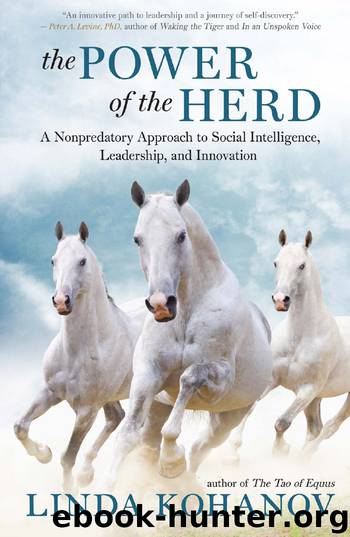The Power of the Herd by Linda Kohanov

Author:Linda Kohanov
Language: eng
Format: epub
ISBN: 9781577316817
Publisher: New World Library
Timeworn Evasions
The initial jolt of awakening to a higher level of awareness and responsibility is so jarring that those of us who don’t receive the kind of unconditional support mentioned in the previous section (and, hopefully, some new behavioral skills to go with it) tend to slide backward, desperately grasping at timeworn evasions. We may try to hide, medicate, or lash out rather than embrace the initial feeling of nakedness and vulnerability. We may blame others instead of looking at our own behavior and acknowledging what role we played in some questionable situation.
From there, we can quickly digress to the deadly arts of objectification and projection, easily receding back into the ancient human habit of punishing, enslaving, or preying upon “lesser beings” who aren’t “sentient” enough to warrant consideration, empathy, and care. It’s a vicious circle. After abusing objectified populations, sometimes simply to release the pressure of our own shame, we must either wake up and finally change our behavior (and both forgive ourselves and make amends for an even longer list of callous, sometimes horrendous acts) or project the additional guilt we feel ever more vigorously, making others pay for the mistakes and weaknesses we struggle desperately to disown. The latter option leads to multigenerational cycles of punishment and revenge. At the extreme end of this spectrum, we find serial killers who dispatch women, men, or even children with incredible cruelty, acting out unresolved betrayals or abuse scenarios in all kinds of “imaginative” ways.
Most shame-avoidance techniques, however, are nonviolent, a dubious side effect of human intelligence: despite significant potential for innovation and expansion, our big brains can be used to actively suppress feelings, experiences, scientific evidence, and personal observations that challenge our limited, selfish agendas. The Buddha called this mental evasion tactic “ignorance,” recognizing that, while it may initially feel more comfortable than letting new information in, this impulse keeps people in an arrested state of mental, emotional, and spiritual development. (Metaphors and techniques for breaking through intellectual blocks to innovation and transformation are outlined in Guiding Principle 6, chapter 18.)
Modern civilization often reinforces the notion that ignorance is bliss, but cultural and political structures designed to help us ignore what challenges us only keep us in limbo. Once innovations and life circumstances crack the comfortable shell that was incubating a much larger, more compassionate, creative, responsible state of consciousness, we can never truly go back to that previously insulated state of being — one that, truly, “knew not” what it was doing, and must be forgiven as a result.
Around 500 BCE, the Buddha offered mindfulness and meditation techniques to address this multifaceted issue. Five hundred years later, a dramatic effort to move humanity through an even more fitful stage of intellectual, emotional, social, and spiritual adolescence inspired the first four books of the Bible’s New Testament. At the height of the Roman Empire, an innovative social activist and religious leader named Jesus spent three years on the “lecture circuit” encouraging people to evolve beyond an extremely violent, predatory way of operating in the world.
Download
This site does not store any files on its server. We only index and link to content provided by other sites. Please contact the content providers to delete copyright contents if any and email us, we'll remove relevant links or contents immediately.
Nudge - Improving Decisions about Health, Wealth, and Happiness by Thaler Sunstein(7706)
Deep Work by Cal Newport(7083)
Principles: Life and Work by Ray Dalio(6447)
The Doodle Revolution by Sunni Brown(4761)
Factfulness: Ten Reasons We're Wrong About the World – and Why Things Are Better Than You Think by Hans Rosling(4742)
Eat That Frog! by Brian Tracy(4540)
Thinking in Bets by Annie Duke(4227)
Hyperfocus by Chris Bailey(4118)
Visual Intelligence by Amy E. Herman(3782)
Writing Your Dissertation in Fifteen Minutes a Day by Joan Bolker(3728)
Ogilvy on Advertising by David Ogilvy(3622)
Hidden Persuasion: 33 psychological influence techniques in advertising by Marc Andrews & Matthijs van Leeuwen & Rick van Baaren(3565)
How to Win Friends and Influence People in the Digital Age by Dale Carnegie & Associates(3562)
How to win friends and influence people by Dale Carnegie(3474)
The Pixar Touch by David A. Price(3439)
Schaum's Quick Guide to Writing Great Short Stories by Margaret Lucke(3381)
Deep Work: Rules for Focused Success in a Distracted World by Cal Newport(3237)
Work Clean by Dan Charnas(3123)
The Slow Fix: Solve Problems, Work Smarter, and Live Better In a World Addicted to Speed by Carl Honore(3009)
